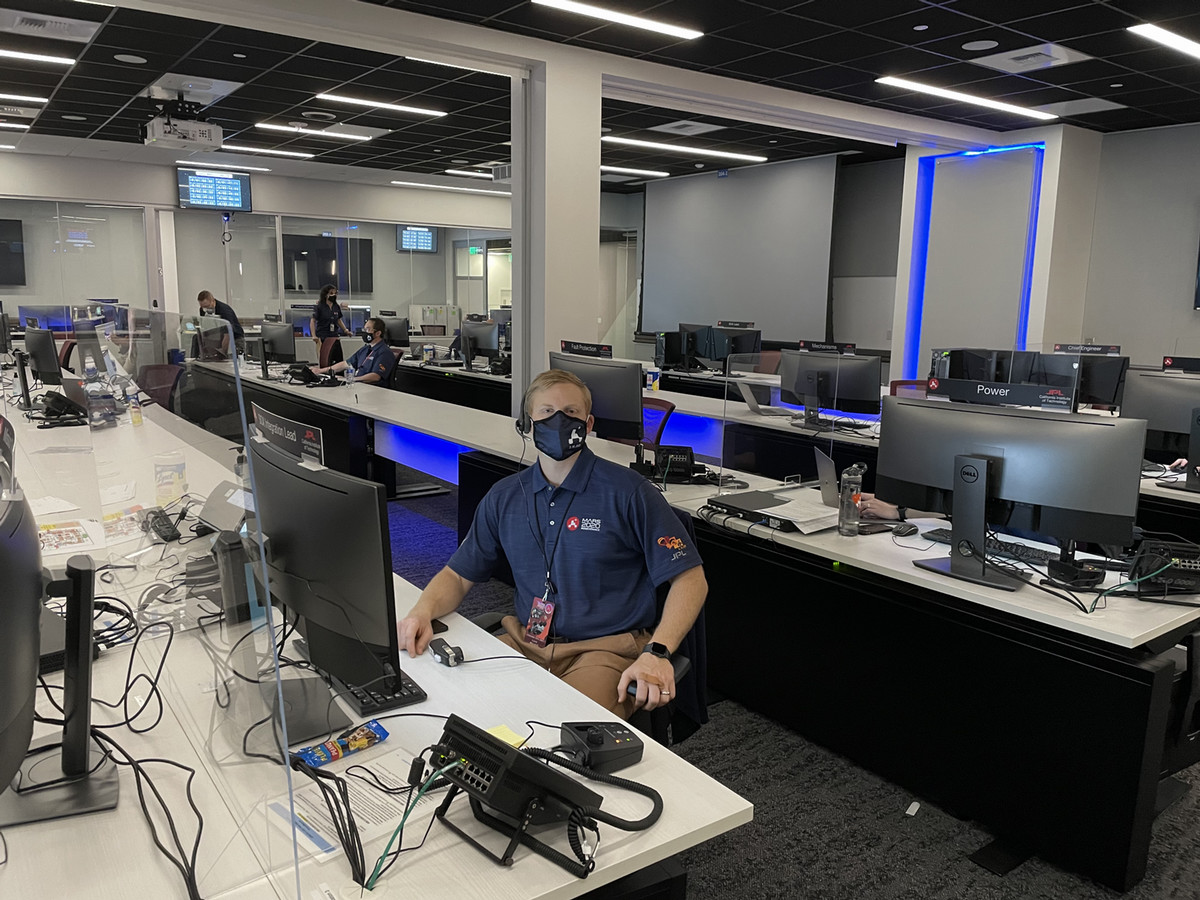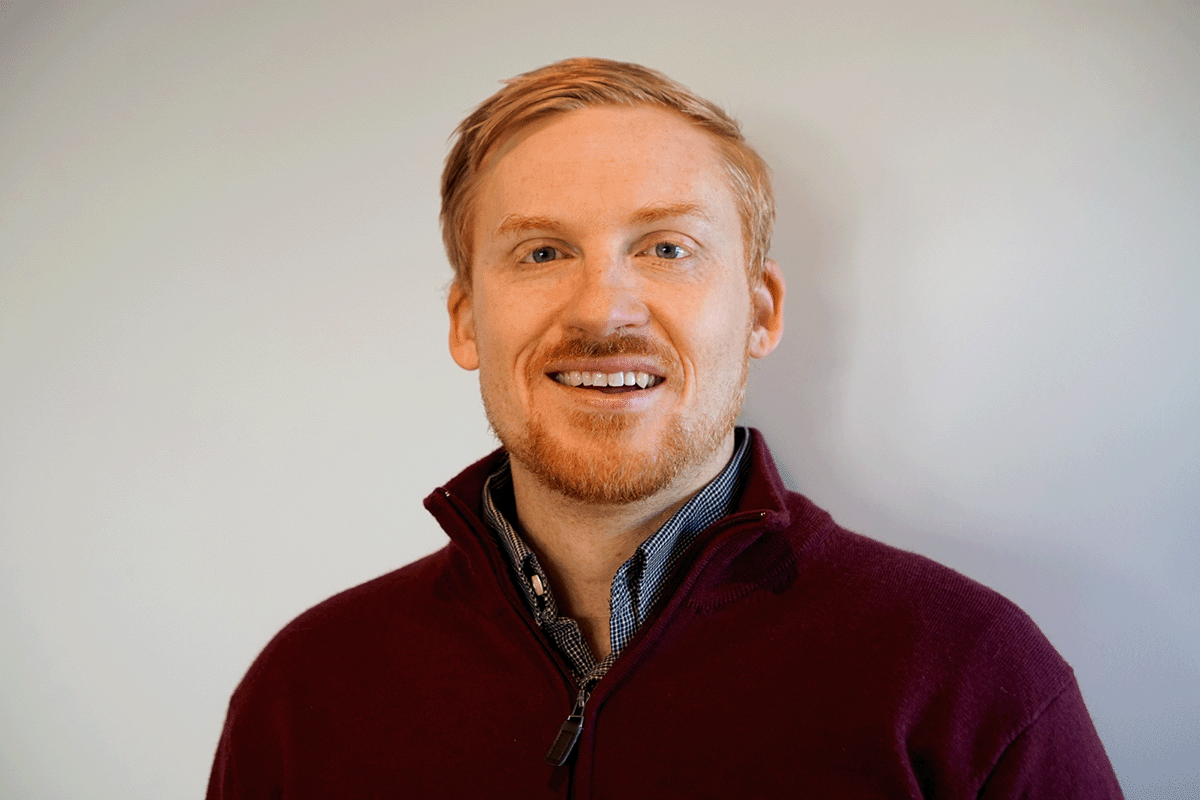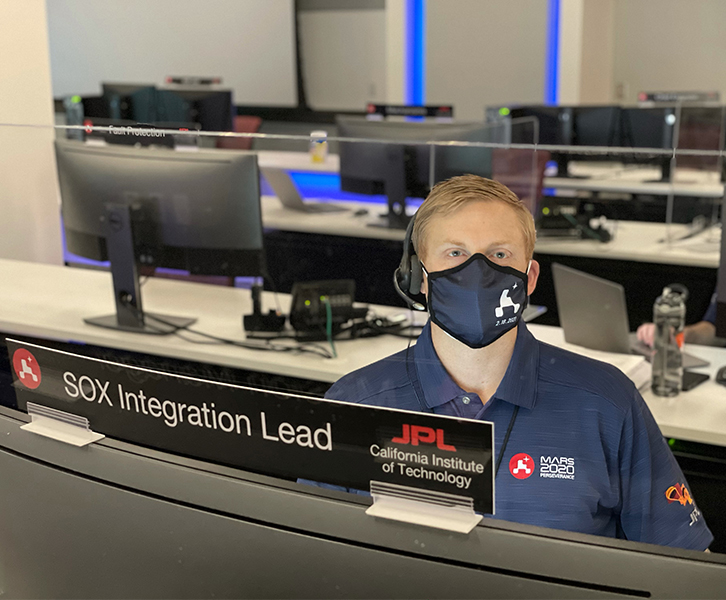Luke Walker may be the only Georgia Tech Scheller MBA alum living on Martian time. Walker is a flight system systems engineer at NASA’s Jet Propulsion Laboratory, working on the Mars Perseverance mission. Not only does his day-to-day job look different than other MBA grads, so does the timing and structure of it.
“One of the weird things about my job is that I’m on Mars time and a Mars day is 25 hours,” said Walker. “During early operations, you’re trying to optimize everything, so we only operate the rover during Martian daytime. We sync our schedule to when the rover is awake, so every day, I wake up 40 to 50 minutes later than the last day. Daytime could be from noon to 10 p.m. and it slowly rotates around.”
Walker has worked on Mars Perseverance for the last six years in a variety of roles. During development of the rover, he was the systems engineer for actuator and motor control, which includes all of the motors that make the rover drive, the arm and head move, and the drill work. Since the rover landed on Mars on February 18, 2021, Walker has held two different roles. During the first five days on Mars, he worked on the surface operations transition, where he had to make sure Perseverance was safe and healthy and started configuring the rover. Since then, he has served as team lead for the mechanisms chair, where he analyzes data that is sent back from the rover. For Walker, one of the most exciting moments of the entire process was landing day, which he experienced in mission control.
 “Whenever something has happened on Mars, it takes 11 minutes for that information to get back to Earth. It’s kind of this weird mind trick where you’re really excited something has happened, but it’s already been done for 11 minutes. It was a really interesting experience because you have no control. We plan everything months in advance and we’ve already put the plans on board the rover, so we don’t do any commanding live. All we are doing is sitting and watching, holding on, and hoping for the best. That moment when I heard ‘Touchdown confirmed, Perseverance is safe on Mars,’ it was just a huge relief,” said Walker.
“Whenever something has happened on Mars, it takes 11 minutes for that information to get back to Earth. It’s kind of this weird mind trick where you’re really excited something has happened, but it’s already been done for 11 minutes. It was a really interesting experience because you have no control. We plan everything months in advance and we’ve already put the plans on board the rover, so we don’t do any commanding live. All we are doing is sitting and watching, holding on, and hoping for the best. That moment when I heard ‘Touchdown confirmed, Perseverance is safe on Mars,’ it was just a huge relief,” said Walker.
After a well-deserved celebration when Perseverance landed safely on Mars, Walker and his team saw the first images sent back from the rover. Two to three hours after landing, the first pictures are sent back through data that is sent from the rover to satellites and then from satellites back to Earth.
“It’s a phenomenal feeling to see those pictures,” said Walker. “I think for the first five days, every time an image would come back, everyone would crowd around the computer screen and just watch. No matter what we were doing, we would stop and pause and look at the pictures. Even if you were supposed to be doing something more important, getting these pictures back from another planet or a place no one has ever seen is pretty neat.”
Walker attributes his love for space after visiting the Kennedy Space Center and Johnson Space Center when he was a kid. Initially wanting to be an astronaut, Walker, a Texas native, realized that he needed to get involved in aerospace engineering, which eventually led him to Georgia Tech.
“When I finished my undergrad, I knew that I wanted to continue and do a master’s in space systems design,” said Walker. “I had taken a couple classes over at the business school and I knew I was interested in the business side of space. Tech offered the chance to blend an M.S. in aerospace engineering with an MBA, so I took that opportunity.”
 One part of business school that Walker really enjoyed was the class discussions that he had at Scheller. Coming from engineering classes where there always was a right answer, Walker looked forward to thinking and talking through cases with this classmates and professors during his time in the MBA program. Walker finds himself regularly using the skills he learned at Scheller in his position.
One part of business school that Walker really enjoyed was the class discussions that he had at Scheller. Coming from engineering classes where there always was a right answer, Walker looked forward to thinking and talking through cases with this classmates and professors during his time in the MBA program. Walker finds himself regularly using the skills he learned at Scheller in his position.
“I took a really cool class on managing teams and classes on technology management that have been helpful as I see how we develop technology at NASA,” said Walker. “I also took a project management class which has been allowed me to speak in terms of cost performance, index, and schedule performance. It was a great experience for me to get my MBA and I would definitely encourage my engineering colleagues to gain that experience. I hope to use even more of it in the future in the business side of space.”
